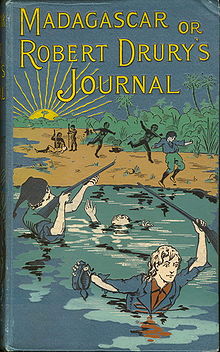Robert Drury (Navigator)
Robert Drury (* 1687 in London ; † 1735 ibid) was an English seaman who wrote a book about his 17-year stay as a shipwrecked man on the island of Madagascar . This book is one of the rare records of southern Madagascar in the 18th century.
Life
youth
Drury grew up in London, where his father ran The King's Head . When Drury was 13 years old, his father sent him to India on the Degrave ship .
On the Degrave , voyage and shipwreck
The Degrave left the port in February 1701 and reached India in a good four months. On the way back, the ship ran aground near Mauritius and was so badly damaged that the Cape of Good Hope could no longer be reached. Instead, the crew had to leave the ship and go ashore at the southernmost tip of the island of Madagascar. The tribal leader in this region, Andriankirindra, welcomed the castaways, but tried to hold on to them in order to distinguish himself from the other tribal leaders.
Madagascar, captivity and escape
An attempt to escape to a tribe friendly to the English was bloodily suppressed. Only a handful of youth survived, including Drury, who became a slave to Chief Andriamivaro . After initial resistance, Drury worked his way up from farm slave to cattle herder and eventually royal butcher and spent the next ten years there. Eventually a war broke out with the neighboring tribe to the west Mahafaly . This was followed by a fratricidal war between the chief Andriankirindra and his uncles and cousins. Eventually the King of Androy became involved in the fighting. In the end, the king of Fiherenana intervened. One of his envoys convinced Drury to flee to Fiherenana, where he could find an English ship. After staying with King Andrianafarana , Drury managed to escape to Bara , he followed the Onilahy River to St. Augustine Bay , where the city of Toliara is today.
On the west coast, Drury initially joined a community of stowaways from Europe, but was soon forced to seek refuge at the court of King Andriamandisoarivo of Boina . When Drury's father was notified by some of the Europeans, he arranged for a ship to fetch Drury from Madagascar.
Slave trader and author
Drury arrived in England on September 9, 1717 after 17 years, his parents having since died. He returned to Madagascar as a slave trader and may have been a pirate at times . In London he often told of his adventures in Madagascar. In 1729 he published his memoirs under the title Madagascar or Robert Drury's diary . The book was highly praised and appeared in seven editions by 1890. Drury died in London in 1735 and was buried in the churchyard of St Clement Danes in the Strand . Other sources date his death between the publication of the third and fourth editions of his book, i.e. between 1743 and 1750.
Review and criticism
With all the success of the book, doubts about its authenticity were soon voiced. The occasion was provided by the numerous takeovers from the book "The History of Madagascars" by Étienne de Flacourt from 1658. Drury also had the same editor as Daniel Defoe and used the same writing style. So it was assumed that it was a Robinsonade invented by Defoe based on Flacourt's book . In 1719 Defoe had told the fate of a shipwrecked man on a tropical island with his novella Robinson Crusoe . He used the perspective of the first-person narrator , so that the impression was created that it was actually Defoe's experiences.
In 1996, the archaeologist Michael Parker Pearson demonstrated the authenticity of Drury's book on the basis of many details as part of an archaeological research project.
Works
- Robert Drury: "Madagascar: or Robert Drury's Journal during fifteen years captivity on that island.", London 1729
literature
- Raymond K. Kent : "From Madagascar to the Malagasy Republic", 1962, ISBN 0-8371-8421-5
- Michael Parker Pearson and Karen Godden , "In Search of the Red Slave," 1996, ISBN 0-7509-2938-3
Individual evidence
- ↑ Michael Pearson Parker and Karen Godden , "In Search of the Red Slave," 1996
Web links
- British Archeology 2002: "Shipwreck into slavery" [1]
| personal data | |
|---|---|
| SURNAME | Drury, Robert |
| BRIEF DESCRIPTION | English sailor and shipwrecked man |
| DATE OF BIRTH | 1687 |
| PLACE OF BIRTH | London |
| DATE OF DEATH | 1735 |
| Place of death | London |


